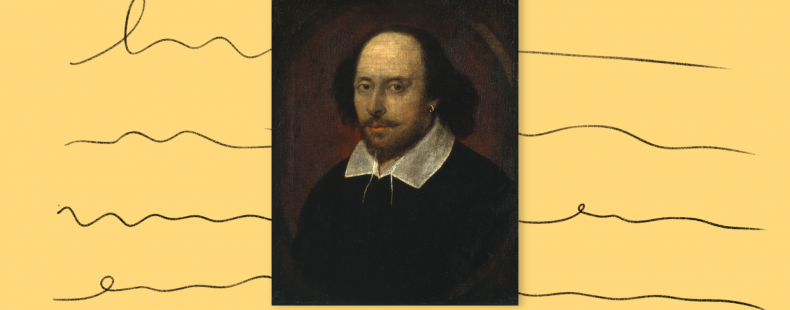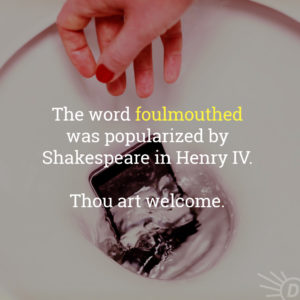William Shakespeare died on April 23, 1616 and was baptized on April 26, 1564. His exact birthdate remains unknown, though it is conventionally taken to be the same as the day his “bones were interred.” In his honor, we wanted to share some words popularized by the man himself.
Did Shakespeare coin the following terms? Probably not. These words may have already been in conversational usage when he committed them to the page, or they may have previously appeared in the writings of his less prominent contemporaries.
Whether or not these words are Shakespeare coinages, his plays unquestionably brought many novel words and phrases to the consciousness of English speakers worldwide. The continued popularity of Shakespeare’s writing keeps 16th- and 17th-century words alive that might have otherwise faded into obscurity. As for other words, it’s hard to imagine them not existing at all in the days before the Bard.
bedazzle
Pardon, old father, my mistaking eyes,
That have been so bedazzled with the sun
That everything I look on seemeth green.
—The Taming of the Shrew (Katherine, 4.5.46–48)
Shakespeare’s bedazzle means “to dazzle so as to blind or confuse.” The prefix be- serves to intensify the verb dazzle, itself a form of the word daze. The word bedazzle has since expanded to mean “to impress forcefully, especially so as to make oblivious to faults or shortcomings.” Some critics or historians might say, for instance, that Shakespeare’s privileged status in culture and the curriculum has bedazzled us.
foulmouthed
… he speaks most vilely of you, like a foul-mouthed man as he is, and said he would cudgel you.
—Henry IV, Part I (Hostess Quickly, 3.3.96–97)
Foul-mouthed, sometimes hyphenated as foul-mouthed, describes someone “using obscene, profane, or scurrilous language; given to filthy or abusive speech.” Shakespeare, to be sure, could be quite the foulmouth, if his own insults are any measure. Henry IV, Part I alone gives English some of its most colorful smears, such as “mad mustachio purple-hued malt-worms.”
bedroom
Then by your side no bed-room me deny;
For lying so, Hermia, I do not lie.
—A Midsummer Night’s Dream (Lysander, 2.2.57-58)
Believe it or not, a compound as simple as a bedroom isn’t found in the English record until the 1580–90s. The word, of course, refers to a “room furnished and used for sleeping.” As Shakespeare used it in this passage of A Midsummer Night’s Dream, though, bed-room is one’s “sleeping space,” as couples have their sides of the bed. Also, Shakespeare’s use of lie here is sexually suggestive, as can be bedroom when used as an adjective.
swagger
… a rascal that swaggered with me last night—who, if alive and ever dare to
challenge this glove, I have sworn to take him a box o’ th’ ear …
—Henry V (Williams, 4.7.114–16)
Hip-hop hitmakers and Shakespeare have a lot in common. They can write sick verses and love the word swagger. By our count, Shakespeare used forms of the word swagger 16 times. For Shakespeare, swagger meant “to walk or strut with a defiant or insolent air” or “to boast or brag noisily.” It’s based on swag, or “sway,” as a swaggerer may so strut—and extended, by 1990s hip-hop, to “a confident attitude.”
well-bred
A gentleman well bred and of good name …
—Henry IV, Part 2 (Lord Bardolph, 1.1.26)
Well-bred is a great example of the lexical dynamic we discuss in the introduction. Shakespeare is sometimes credited with inventing the word well-bred, or “well brought up; properly trained and educated,” but evidence for the term in 1585 predates his writing. Well-bred may well have spread thanks to Shakespeare’s work, but we shouldn’t say he coined it. Consider yourself … properly educated.
champion
… come fate into the list / And champion me to the th’utterance.
—Macbeth (Macbeth, 3.1.72–73)
Shakespeare’s lexical genius wasn’t just dreaming up new words. It was also applying existing words in novel ways. Take champion. The noun has been found in English since the early 1200s, originally referring to a “fighter or warrior” (and not “victor” until the 1700s). Shakespeare’s Macbeth is one of the earliest known instances of champion as a verb; in the context of the play, Macbeth speaks of fighting fate in one-to-one combat. Think we all know how that one turned out …
The more contemporary verb sense of champion, “to act as champion of, defend, support,” comes about by the 1800s.
droplet
… thou abhorred’st in us our human griefs,
Scorned’st our brains’ flow and those our droplets which
from niggard nature fall …
—Timon of Athens (Alcibiades, 5.5.80–82)
A droplet is “a little drop,” as of water, rain, or tears. The –let is a diminutive suffix, also seen in words like booklet or ringlet. Another fun fact: In Renaissance England, tears were thought to emanate from the brain.
pageantry
… What pageantry, what feats, what shows,
What minstrelsy, and pretty din,
The regent made in Mytilene
To greet the king …
—Pericles (Gower, 22.6–9)
Shakespeare’s pageantry is “the performance or pageants,” a pageant here being “an elaborate public spectacle illustrative of the history of a place, institution, or the like, often given in dramatic form or as a procession of colorful floats.” It was the idea of a “spectacle” that led pageantry to its more familiar sense of “a magnificent display”—or an “empty” one, all show and no substance.
inaudible
For we are old, and on our quick’st decrees
Th’inaudible and noiseless foot of time
Steals ere we can effect them.
—All’s Well That Ends Well (King of France, 5.3.42)
Inaudible is “not audible; incapable of being heard.” In–, here, is doing the work of negation. And, in case you weren’t certain what inaudible meant, Shakespeare explains it just a beat later: noiseless. Time: It really knows how to get around on its tiptoes.
eyeball
… Hold up thy head.
Look in mine eyeballs, there thy beauty lies.
Then why not lips in lips, since eyes in eyes?
—Venus and Adonis (118–120)
Like bedroom, eyeball, or “the ball or globe of the eye,” seems like such a natural word that it might feel staggering to learn it’s not attested in the written record until the 1570s. It’s not a Shakespeare original, but it is the stature and success of his works that helped attract our eyeballs to the word.













